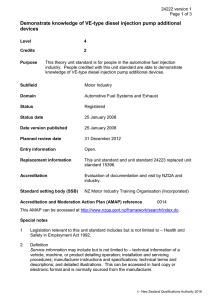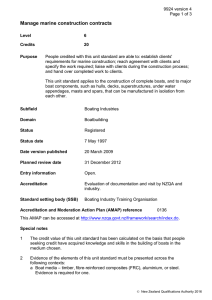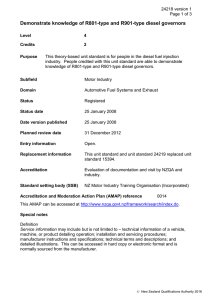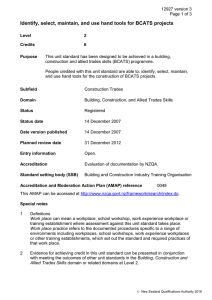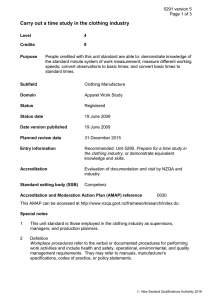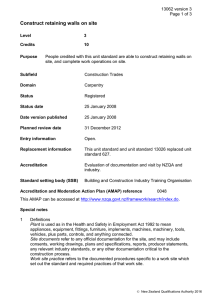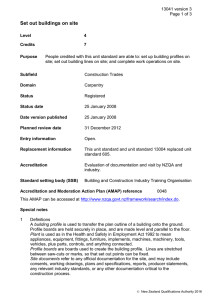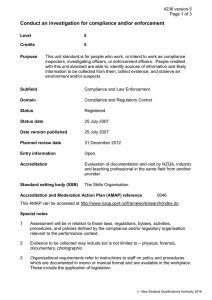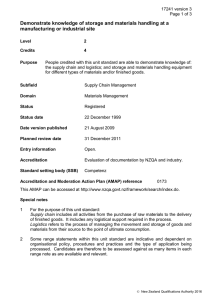Serve legal documents, as a security operator
advertisement
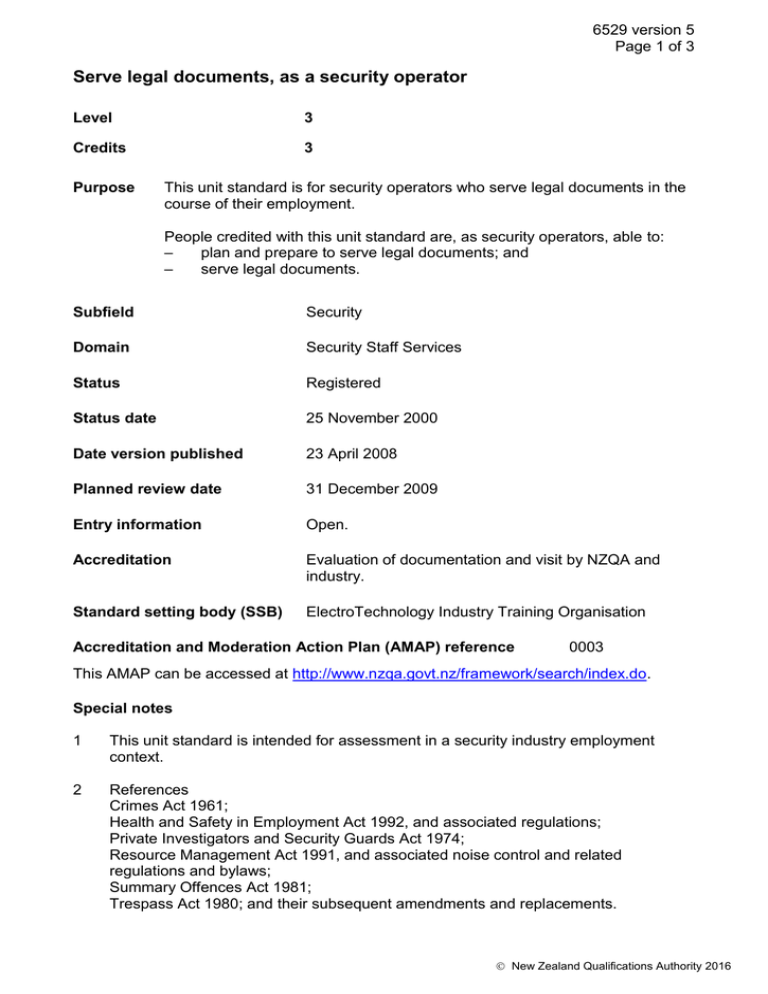
6529 version 5 Page 1 of 3 Serve legal documents, as a security operator Level 3 Credits 3 Purpose This unit standard is for security operators who serve legal documents in the course of their employment. People credited with this unit standard are, as security operators, able to: – plan and prepare to serve legal documents; and – serve legal documents. Subfield Security Domain Security Staff Services Status Registered Status date 25 November 2000 Date version published 23 April 2008 Planned review date 31 December 2009 Entry information Open. Accreditation Evaluation of documentation and visit by NZQA and industry. Standard setting body (SSB) ElectroTechnology Industry Training Organisation Accreditation and Moderation Action Plan (AMAP) reference 0003 This AMAP can be accessed at http://www.nzqa.govt.nz/framework/search/index.do. Special notes 1 This unit standard is intended for assessment in a security industry employment context. 2 References Crimes Act 1961; Health and Safety in Employment Act 1992, and associated regulations; Private Investigators and Security Guards Act 1974; Resource Management Act 1991, and associated noise control and related regulations and bylaws; Summary Offences Act 1981; Trespass Act 1980; and their subsequent amendments and replacements. New Zealand Qualifications Authority 2016 6529 version 5 Page 2 of 3 3 Health and safety legislation applies to all security industry activities and assessments should reflect this requirement. 4 Definitions Personal safety – refers to the safety of the operator but may include the safety of others. Relevant instructions – are organisational compliance requirements relevant to the unit standard, element, and/or performance criterion, including but not limited to: assignment instructions – orders and/or instructions issued to govern the performance of tasks, duties, and responsibilities on a specific assignment; company instructions – policies, procedures, and instructions issued by the employing company, enterprise, or organisation; Risk assessment – the process used: to assess risks in any sensitive, critical, potentially dangerous, or challenging situation; to assess the possible outcomes of various courses of action; and to select the best plan or course of action. 5 All activities assessed for the purposes of this unit standard are conducted within the law. Elements and performance criteria Element 1 Plan and prepare to serve legal documents, as a security operator. Performance criteria 1.1 Instructions to serve documents are confirmed with originator and are validated to ensure compliance with law and other relevant instructions. 1.2 Plan is developed in accordance with critical planning factors. Range 1.3 critical planning factors include but are not limited to – nature of the document, movement and behaviour pattern of recipient, time available, geographic and traffic conditions, resources available, safety issues. Contingency plan takes into account anticipated variations to original plan. Element 2 Complete service of legal documents, as a security operator. Performance criteria 2.1 Documents are served to intended recipient in accordance with circumstances, risk assessment, plan, and relevant instructions. New Zealand Qualifications Authority 2016 6529 version 5 Page 3 of 3 2.2 Approach and communication with the recipient is consistent with circumstances, is non-threatening, and is in accordance with risk assessment, legal requirements, and relevant instructions. 2.3 Personal safety and security are not compromised, and advice and assistance are requested in accordance with circumstances, assessed need, risk assessment, and relevant instructions. 2.4 Documentation is completed in accordance with relevant instructions and legal requirements. Please note Providers must be accredited by NZQA, or an inter-institutional body with delegated authority for quality assurance, before they can report credits from assessment against unit standards or deliver courses of study leading to that assessment. Industry Training Organisations must be accredited by NZQA before they can register credits from assessment against unit standards. Accredited providers and Industry Training Organisations assessing against unit standards must engage with the moderation system that applies to those standards. Accreditation requirements and an outline of the moderation system that applies to this standard are outlined in the Accreditation and Moderation Action Plan (AMAP). The AMAP also includes useful information about special requirements for organisations wishing to develop education and training programmes, such as minimum qualifications for tutors and assessors, and special resource requirements. Comments on this unit standard Please contact the ElectroTechnology Industry Training Organisation reviewcomments@etito.co.nz if you wish to suggest changes to the content of this unit standard. New Zealand Qualifications Authority 2016

